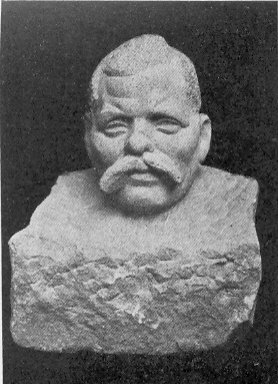
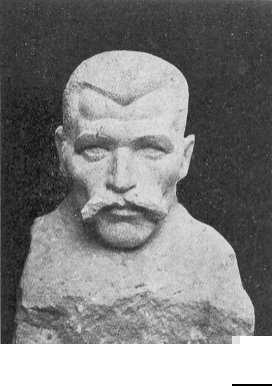
CHAPTER XI
Getting into print
A.
Bulgarian literature is a recent creation, the child of very old traditions and of very new historical events. Much of it came into being as a weapon to aid the Bulgarians in their struggle for liberation and progress. Other parts of it are exuberant expressions of the joy that followed liberation and that accompanied the rapid steps toward civilization. Not a little of it consists of patriotic outpourings. Some of the best of it is made up of narratives of village tragedies and romances and descriptions of patriarchal life.
Bulgarian literature is fiery and sombre. It seems to me to be very thoroughly Slavic. Many of its novels and short stories paint sad pictures. Some of its poems are confessions, others are challenges and many are appeals to heroic actions of the extremes kinds. They tend to be despondent or exultant, displaying irrepressible faith and inconsolable despair. Bulgarian poetry is restless, throbbing, moving. It contains but few psalms and rarely soothes or calms; it plunges one into the depths, bears him off on the wings of passion, sweeps him into grand crusades.
Without any doubt Bulgarian literature is one of the most significant of the nation's creations. How much of it will live through future decades one would not like to predict and how much of it deserves a place beside the best modern literary productions of the western world one cannot easily say, but he may be certain that it affords the best possible knowledge of the feeling, aspirations, repressions and struggles of a very interesting people, recently emerged from a long and deadening slavery. Many of its gems are well worth knowing and plainly show that the Bulgarians have a genius for brilliant artistic creation.
Unfortunately the furious turbulence of Bulgaria's cultural life consumes not a few of the artistic capacities of the nation. Schools, tendencies and movements annihilate one another as well as the creative forces bringing them into being. Literary men spritually slay each other in the name of their Muses. The zeal of their schools eats them up. There is a distressing amount of negation. Practically every group vehemently denies the qualities of every other. Giants dispose of giants and all their little retainers fall with them in the carnage.
The bitterest conflicts have raged over the classic dispute as to the
real nature of art. Does art carry within itself its own supreme criterion
and measure or is it to be justified, criticised and directed by extraneous
norms, such as patriotism, national well-being, morality and religion.
This is the age old dispute between "art for art's sake" and art for humanity's
sake. The question is: Are the Bulgarian writers to create a specifically
Bulgarian literature for the purpose of helping the Bulgarians get ahead
or are they to create a section of universal literature designed to answer
the eternal and absolute needs of art? It seems an academic and theoretic
question but in Bulgaria it has not been such.
 |
 |
In the beginning Bulgarian literature was especially and peculiarly Bulgarian. It served to help the people attain their freedom and then to appreciate and consolidate it. Like Bulgaria's revolutionary cherry-tree cannon and her. constitution, it was created for the sake of the cause. Many writers consider this a rather crude and simple conception of the mission . of poetry and song. Too close association with the gods of good harvests, of victory and of the three R-s is thought rather humilliating for the Muses. To the authors inspired by foreign models Bulgaria seemed small and drab and stifling, while her new literature appeared horribly domestic, provincial and slipshod so they tended to spurn it in a noisy and demonstrative manner. The better educated writers returning from Berlin, Paris, Rome and other capitals found Bulgarian poetry like the jingles or ditties of a village and they feverishly set about to make it "general", European, "classic, part of the artistic treasure of the ages.
This conflict has divided Bulgarian literature into the older and more patriotic productions en the one hand and the new, more universal works on the other. The two great figures in the first group are Christo Boteff and Ivan Vazoff; the creator of the second is Pencho Slaveikoff.
The man first mentioned, Christo Boteff, holds an absolutely unique place in Bulgarian literature and history. He is the most frantically arid vehemently loved person that ever wielded a Bulgarian pen and sword. He is an imperious and commanding personality, an embodiment of the love of song, the reforming passion, the liberating fire, the cosmic dreams, the boundless devotion and the consuming impatience that burn in Bulgaria's Slavic soul. Boteff was a fierce, inspired, uncompromising martyr who in a knightly manner devoted his all to "the cause", asking nothing for himself but the right to command those who went to certain death.
He was the Paul Revere of Bulgaria. He aroused his people. He rang alarm bells. He called sluggish, timid men to join the crusade for liberty. He was too precipitous, too self-assertive, as irrepressible as William Lloyd Garrison. He was a comet sweeping majestically over a black sky. But he left a light there that will never go out. This quickly passing flame has given a brighter and a hotter constellation to the Bulgarian heavens than all the other Bulgarian suns and stars combined.
Boteff stirs, stimulates and dominates. He lifts little people, such as we all are, up above petty vanities and trivial worries into a heroic realm of unselfish combat for the good and the right. His body is that of a gladiator, his long black beard is that of a mountain revolutionist hurling imprecations on drawing rooms, coffee-houses and soft rugs; his piercing eyes are cosmic searchlights disclosing a liberated humanity and universal brother-hood; his high forehead, set off by leonine black hair, impels you, for a moment at least, to stop buying and selling, bickering and cheating, strutting and grovelling and to gaze upon an imagined, ordered utopia where there will be no more oppression and mass degradation. And this proud, pulsating challenge of Boteff's figure, adored by every youth that speaks the Bulgarian tongue, is far surpassed by the few verses he has left, which excoriate injustice, extol martyrdom and call slaves to arise and strike for liberty.
He was born in the little town of Kalofer in 1848. At that time Bulgaria was under the domination of the Turks and most of the nation was very ignorant and apathetic, too dull and timid even to strive for freedom. But Boteff's family was an exception; his father was a school teacher distinguished for his patriotism which was-ardent though cautious. Consequently young Christo early acquired some knowledge of his people's history and of the world in general and learned that the Bulgarians were practically the only Christian nation left under the yoke of Turkey. He could not but see the rank injustices committed every day upon his helpless fellow citizens and observe how the capricious and powerful Turkish grandees were aided in their tyranny by many leading Bulgarians. It was this that outraged and incensed the fiery-eyed boy more than anything else. It seemed to him the very abysm of treachery and baseness that the Bulgarian "chorbadjias" or chief citizens should for their own interests cooperate with Turkish masters in pillaging and despoiling their simpler fellow countrymen. Boteff was unable to conceal his indignation and fearing that some of the Bulgarian wealthy men whom he denounced would report him to the Turkish authorities as a revolutionist he left his country and went abroad where he spent practically all of the rest of his life. For a number of years he studied in Russia and later settled in Rumania — if it can be said. that such a man ever settled — where he devoted himself to teaching, to publishing short-lived revolutionary papers and to preparing for an uprising against the Turks. With him thought and action were one; poetry was deeds.
Boteff in every fiber of his being was a revolutionist. And a revolutionist on a grand scale. His immediate aim of course was to liberate Bulgaria from the Turks, but that was only part of his dream. He wanted to form a Balkan Federation and thus prevent all future Balkan wars. He wanted to liberate the poor from the rich, the simple from ignorance, the superstitious from the clutches of avaricious priests. Not only was he a typical Slav with grand ideals of universal brotherhood and justice but he had spent [much time in Russia and imbibed there certain specifically socialistic ideas. He belonged to no regular school and worked out no definite system of reform but was far more than a mere Bulgarian patriot and that fact greatly added to his charm and his fire. He dreamed dreams like the old Hebrew prophets; he wanted to see a Zion lifted up and all the Balkan nations flowing unto it; he yearned for the great Armageddon when all the poor and weak would be made happy and free. In a language whose vehemence and facility of diction no Bulgarian has ever equalled, he poured out his wrath on all oppressors, on all time servers and on all prudent cowards, especially those of his own race, and called the youth to action.
Boteff lived wretchedly and had the greatest difficulty in keeping his papers going. Most of the men about him were exiles and outlaws so that all his days were restless, hectic, feverish. He was impatient, intolerant, anxious to strike some immediate blow. He believed that if he appeared in Bulgaria and started armed action against the Turks all the Bulgarians would join him in a grand crusade and drive out their oppressors. He actually gathered a group of youth together, armed them, commandeered an Austrian boat, crossed the Danube River, dramatically kissed the soil of his native land and pressed into the Balkan mountains toward the city of Vratsa. At last the ideal of his life was being realized. Christo Boteff and his band were fighting the Turkish Empire. Liberty or Death was written on their caps. Liberty or Death had been the refrain of his beautiful and fiery poems and now he was there to bring liberty or meet death. The cast die spelt both Liberty and Death. The Turkish army surrounded the revolutionists and killed most of them including Boteff. That was in 1876; two years later the Russian and Rumanian armies crossed the Danube river and gave to the Bulgarians the freedom of which Boteff and his comrades had dreamed. No, not the freedom for which they had dreamed for no freedom when it comes is anywhere near as beautiful as the people who worked for it expected it to be, but still Boteff's people got such freedom as poor mortals are destined to enjoy.
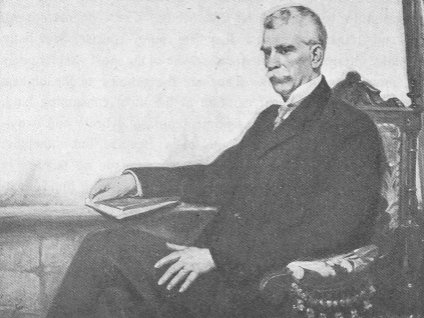
Painting by N. Mihailoff
Ivan Vazoff, the father of modern Bulgarian literature
He left in all 22 poems. Many of them are inspired by and modelled after Bulgarian folk songs, the most fruitful source of Bulgarian poetic vision. Some of them are rather crude in form and vulgar in their vehemence of denunciation but others attain to almost faultless form and breathe the highest sentiments, namely the desire to lay down one's life for another. They all quiver with indignation against injustice, sluggishness, cowardice, self-interest and the degradation of sacred trusts and flame with a passion to help the weak and needy. These poems appeal, grip and transform because they are pure, concise, beautifully rhythmic, utterly disinterested and woven of the most vital longings that move human hearts. They are the essence of the highest romance. They are sheer emotion of the most consuming kind, not so exalted as religious sentiment nor so delicate and exquisite as the devotion of a Dante to a Beatrice but sweeping, enthralling, mastering. The Bulgarians have made no mistake in learning most of Boteff's poems by heart, in making him a comrade in every home and in nursing his fire in their souls. Some of what he has written certainly deserves to find a place beside humanity's very finest songs of freedom.
One of the most popular of Boteff's poems is "My Prayer", in which he
rather vividly expresses his ideas about religion. Boteff had very little
respect for priests ; in fact both in his poems and prose articles he most
scathingly denounced them for their easy life, their formalism, their tranquil
acceptance of national wrongs and injustices, their venality and lack of
sympathy for the suffering masses. He thought they all ought to be flaming
rebels daily risking their lives for the liberation of their people and
because they cautiously performed their more or less meaningless rites
and capitalized the superstitions which they fostered, Boteff considered
them nothing less than traitors. There was but one thing he wanted — liberty
— and he believed that religion, schools, business and art should all devote
themselves exclusively to the attaining of this ideal. Any religion which
served to make slaves resigned to their slavery seemed to him detestable,
yet he was not opposed to the worship of the God of justice, right and
heroic social service, as we see from his poem.
A PrayerO, my God, Thou Lord of justice —
Not the one in far off heaven —
But, Thou, God who dwell'st within me,
In my heart and in my being,Not the one who out of mud balls
Made a man and then a woman,
Whom he left, enslaved, to suffer,
Bound in chains and bent with labor,Nor the one who asks submission,
Makes us cringe and say our prayers,
Feeds our hearts with empty stories
Of gold mansions and white stairs,But my God of mind and reason,
Champion bold of slaves and pris'ners,
Whose Great Day of liberation
Soon shall dawn for all the nations,Kindle in me. God Almighty,
Burning love for human freedom,
Help me fight with dauntless courage
The enslavers of my people.Stregthen my right hand, O
Father, When the slaves arise from slumber;
Make me one of Thy bold warriors;
Take my life — give others freedom.
Much more touching and moving than this is the revolutionist's song
"To My First Love". This is again an exaltation of the supreme- sacrifice
for the sake of liberty. He does not renounce love as such. He has none
of the feeling of an ascetic; he does not consider warm, romantic love
an evil. On the contrary he is very full of life and of a passion for happiness;
he delights in nature, in comradeship and caresses. Endowed with a very
sensitive nature he has a special capacity for love and affection, for
the appreciation of soft cheeks, bright eyes, the wilfulness of charming
maidens and the masterful abandon of youthful passion, yet he rejects them
all for his cause. He considers them not only secondary but harmful, poisonous
temptations, seductions that allure one from the path of duty. So he leaves
his first love and plunges as an outlaw into the mountains in order to
answer the call of the enslaved and oppressed and give his life for their
liberation.
Even more touching, because more intimate, vital and real is Boteff's poem "At Parting". It is the revolutionist who sings. He is saying goodby to all the sweet and lovely things of life and going forth to his calvary. However, there is no whining and no regrets. It is rather an exaltation of bravery and devotion, an exultant rejoicing in the opportunity to die for the needy and exploited and an appeal by the rebel to nature and his friends to assemble and decorate him and his comrades for the glorious, triumphant journey to a sacrificial death. They are going to their doom but Boteff rejoices and calls upon his people to adorn him as for a wedding.
And most moving of all is the song about the slain revolutionist Hadji Dimiter, which contains a number of lines that for many future decades will continue, to be the best known verses in Bulgarian poetry. All of Boteff's poems are frequently declaimed, they are repeated by all Bulgarian insurgents as their gospel and indeed Boteff himself declaimed them to his friends before he gave any of them to be printed. But nothing written by him or anyone else in the Bulgarian language is so frequently sung and spoken as Hadji Dimiter. This is .an inspired apotheosis of the death that comes as the price of freedom. It is the delicate, lyrical, exultant summoning of all that is beautiful, pure and adorable in the universe to come and give honor to the rebel, lying not dead but transformed upon the mountain. As the Old Testament writers took Elisha, the friend of God, to heaven in a chariot of fire, so Boteff in infinitely more beautiful and moving language takes a slain revolutionist into the heaven of heros where white-robed angel-maidens surround him with eternal glory.
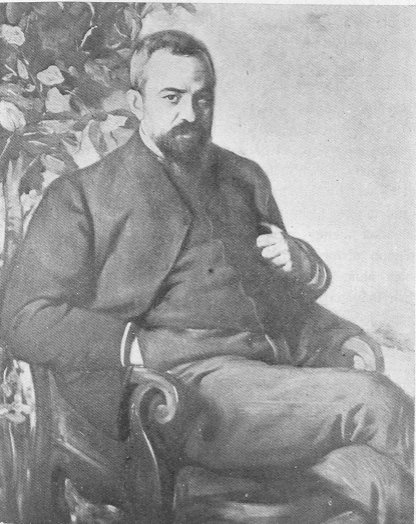
Painting by N. Mihailoff
Pencho Slaveikoff, the most cultured, most European and
least provincial of Bulgarian writers
It is very significant that Boteff is not classified in any exclusive school of poetry; rather is he claimed by all schools and all parties. Technically he belongs to those who believe in art for life's sake. He would have considered himself a base traitor if he had courted poetry for its own sake or revelled in the beauty of liquid phrases and alluring pictures just for the joy they gave him. Poetry for him was a tool, it was "degraded" to the service of a cause; it was used to make rebel hands hold guns more firmly and flashing eyes aim them more accurately; yet there was so much abandon, spirit and passion in his verses and his whole life was so much like a poem that practically every literary group in Bulgaria has flattered itself by considering him one of them. Likewise the Socialists and Communists, the patriots and pillars, the students and the shoeblacks, the nationalists and the internationalists have all made him their hero. The delicate beauty of his fiery lines and the utter unselfishness of his life have made him the favorite of all the Bulgarians.
Boteff was not the only pre-revolutionary Bulgarian writer but he was by far the greatest. And as the aim of this little book is not to give a list of the names and qualities of all the worthy Bulgarian literary men but rather to attempt to leave an impression of the nature of Bulgarian literature I shall cite Christo Boteff alone as the representative of the period ending in 1878 when Bulgaria was freed from Turkey. The chief representative of the decades immediately following was Ivan Vazoff.
* * *
Vazoff is the most productive writer in the history of Bulgarian literature. He was born in 1850, that is 28 years before the war of Liberation and died in 1922, that is after the Balkan wars and the World War, so his life. synchronizes with almost the whole of Bulgaria's modern history. And it was to an adequate and moving description of that history that he devoted all his varied and brilliant talents. Vazoff was Bulgaria's national poet, her unofficial poet laureate. The mission of Boteff, who was a few years older than Vazoff and died almost before the latter began to write, was to stir his people to revolt while Vazoff's task was to inspire his people with faith an,d confidence in themselves, with love for their country and reverence for the heroes who had made their liberation possible.
Vazoff was a patriot, naive, unabashed, ardent. He loved
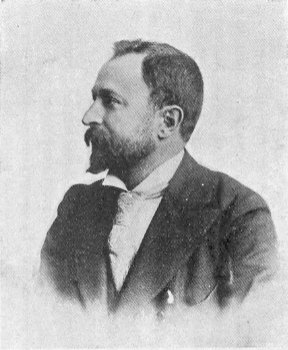 |
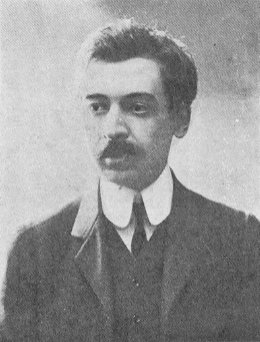 |
| Aleko Contantinoff, Bulgaria’s classic humorist, the creator of the famous character “Bai Ganyou”, a crude, simple, aggressive, egoistic Balkan Babbitt | P.K. Yavorov a restless poet of very fine sensibilities. He wrote boundlessly sad verses, full of vigor, fire and music, a-throb with fascinating despair |
Bulgaria more than anything else in the world. He was thrilled by her woods, plains, valleys and mountains; he thought they were among the most beautiful on earth and when he gave himself up to Bulgarian nature it made him think of God. He was proud of the peasant and gardener; he rejoiced in the new schools springing up everywhere and revelled in the thought of hundreds of thousands of children trudging to them every morning to learn their A-B-C's. He was passionately attached to the Bulgarian language, loved to praise the patriots who had fought for its preservation in centuries of darkness and did much to give it form, grace, stability and elasticity. He never ceased to be inspired by the men who suffered martyrdom in order to create a free Bulgaria and he extolled their exploits and sacrifices in many exceedingly impressive poems. He liked the old Bulgarian traditions and embodied them in well written ballads. He portrayed the romance of Bulgarian development in many dramas and recorded big and little episodes of Bulgaria's struggles in lengthy novels and short stories.
In a word, Vazoff gave all of his love to Bulgaria and to everything that was Bulgarian and he had the ability to extol whatever he loved in songs, dramas and novels. In practically every field it was he who drove the first furrow. He was the model; he set up the standard; he was the first extensive creator; he was the father of Bulgarian literature. The service he rendered his country is beyond estimate, and anyone who wants to understand what the Bulgarians were, up until the beginning of the present century, cannot do better than to read Vazoff.
At present it is in style to belittle him and minimize his creations. He is called a "wornout hand organ". He is looked down upon patronizingly by younger critics with European culture and considered a rather naive old duffer. He is thought to be provincial and domestic with inadequate artistic standards. When placed beside the capital literary productions of the outside world his poems and stories seem rather simple and domestic. According to some critics he is, to say the most, the Longfellow of Bulgaria, a good-natured, well-meaning James Whitcomb Riley. Vazoff used art for propaganda, used it to toot the achievements of his nation struggling forward and that is an unpardonable offense in the eyes of those who believe in art for art's sake. It is, they say, somewhat as though Edgar Arlington Robinson should use his talent to write rhyming ads for breakfast foods or liberty bonds.
Such a reaction was of course inevitable. Many Bulgarians are discarding their old costumes, tearing down their old houses, that embodied a simple, distinctive style of architecture, and are singing jazz in the place of old folk songs so it was to be expected that Vazoff's continuous pipings about Bulgaria should come to seem dull and banal. But this does not mean that Vazoff was a mediocre artist or that his creations are permanently antiquated. Long skirts follow short skirts, wide sleeves follow no sleeves at all and fashions in literature change even more rapidly than "modes" in clothes, so Vazoff, who dominated Bulgarian literature completely for four decades, will again have his day. If Burn's poems in spite of their quaint language and homely subjects still exert a charm and if Walt Whitman, in spite of his rather stilted cosmic tooting, is still loved, so Vazoff also will remain one of Bulgaria's very greatest literary figures. He has not quite so much fire and warmth and immediacy as Boteff nor the finished form of one or two of his younger successors but, taken as a whole, he is still the giant of Bulgarian literature, the greatest Bulgarian writer.
His best novel, "Under the Yoke", which was written during the next to the last decade of the XIX century, has been translated into English and several other foreign languages. It describes the period of the Bulgarian uprisings against the Turks and strikingly portrays the life and habits of the people of that time. It was this book that first brought the attention of the world to the artistic capacities of the peasant nation of the Balkans.
But this was the smallest part of Vazoff's mission. His chief task was to write for his own people. He was his nation's greatest teacher, its first missionary. It is primarily through Vazoff that the Bulgarians intimately know their recent history. It is his masterful songs that have impressed each great man upon the hearts of every new generation. He has encouraged the children to work and to study. His writings, prose and poetry, constitute the best popular geography in Bulgaria. His moral lessons are inspiring and wholesome. His idealistic pictures of village life are among the best in the language. For many decades more of Vazoff's poems were declaimed in schools and at entertainments than of all the other writers put together."
Bulgaria's greatest poet, dramatist and novelist was "safe and sane".
He was an advocate of the Balkan equivalent of "sweetness and light". He
was not a Bohemian. He was a proper middle class man from a well-to-do
family. He extolled common virtues. He was optimistic. He had vast admiration
for the heroes of his people and unshaken faith in his nation's destiny.
This of course does not mean that he had no capacity for strong and for
delicate feelings. His poems, as all true poems, are highly emotional.
Vazoff became moved by almost everything Bulgarian; then he idealized his
feelings and transformed them into songs which never fail to captivate
those who listen sympathetically. That is his great achievement: to take
Bulgaria's history and geography, her pains and hopes and achievements
and give them to his people as stirring verses which sing themselves into
millions of hearts. It was Bulgaria's good -fortune that she had a poet
of genius who loved a peasant land and never tired of singing of and to
its inhabitants. It was Vazoff's good fortune that Bulgaria never seemed
to him too crude and insignificant to sing about nor too obscure and simple
to sing to. The fiery rebel, Boteff, exercises a greater spell over restless
youth than any other poet but the writer who did most for the newly liberated
Bulgaria was certainly Ivan Vazoff.
[Previous] [Next]
[Back to Index]